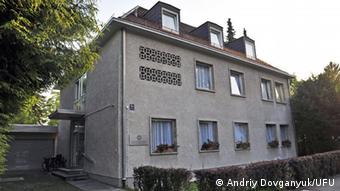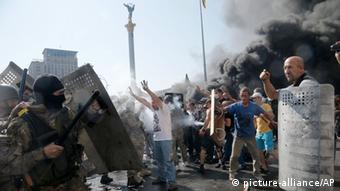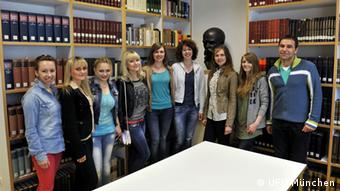Welcome
....to JusticeGhana Group

JusticeGhana is a Non-Governmental [and-not-for- profit] Organization (NGO) with a strong belief in Justice, Security and Progress....” More Details
Ukraine crisis draws students to unique Munich uni
- Details
- Category: Uncategorised
- Created on Saturday, 09 August 2014 00:00
 Ukraine crisis draws students to unique Munich uni
Ukraine crisis draws students to unique Munich uni
08 August 2014
The ongoing crisis in Ukraine is drawing an increasing number of students to the one-of-a-kind Ukrainian Free University in Munich. There's room there for open political discussion - and understanding.
Stephan, a student at the Ukrainian Free University in Munich, notes in hand, breathes a sigh of relief as the instructor nods. His presentation about the Maidan and its impact on the Ukrainian language went over well. Stephan gave his talk in Ukrainian. The UFU is the only Ukrainian university outside the country which holds courses in Ukrainian and is qualified to confer academic titles.
Michael Moser, an Austrian-born lecturer at UFU, says that the Maidan protests and political developments in Ukraine are a focus of his lectures. "For me, it's about the responsibility we have as people who are considered by others to be intellectuals."
Freedom of opinion
Founded in 1921, UFU was located in Vienna and Prague before settling in Munich. It has been recognized by Bavaria's Ministry of Culture, which means that the degrees it offers qualify students to work in Germany. Graduates' job prospects seem to be bright; they find work in companies that do business in Ukraine or other eastern European countries.
The school only offers post-graduate degrees, however, so students have to come with a Bachelor's degree from another institution.
 While most of the students have a strong connection to Germany already, Taras is one of the few exceptions. He came to Germany after finishing a degree in history in Ukraine.
While most of the students have a strong connection to Germany already, Taras is one of the few exceptions. He came to Germany after finishing a degree in history in Ukraine.
"The education system there is still strongly influenced by the political culture of the Soviet Union," Taras said. "That's why I am looking forward to another approach to topics that interest me - one that's more Western." What impresses him most is that the professors at UFU freely express their own opinions and don't shy away from discussing political issues.
Many opinions, one identity
Another positive aspect for Taras, who grew up in the western part of Ukraine, is that at UFU he has the chance to meet other Ukrainians from all parts of the country. The students do not necessarily share the same political views, says Taras. They may support different political parties and hold different views on how to reform Ukraine, but what unites them is their identity as Ukrainians.
There are no real conflicts among them, adds Taras, and no one wants to see the country fall apart. Many of the students have supported the protesters on Maidan Square and collected donations for them.
 Katarina, another student at UFU, comes from Lugansk in eastern Ukraine, where pro-Russian separatists have proclaimed a people's republic. Her first language is Russian.
Katarina, another student at UFU, comes from Lugansk in eastern Ukraine, where pro-Russian separatists have proclaimed a people's republic. Her first language is Russian.
"We spend a lot of time debating the political situation, and that has changed my opinion," said Katarina. "I always thought that western Ukrainians were hostile towards Russian-speaking people. But I have come to understand that this is not true at all."
At home in eastern Ukraine, she adds, it is difficult to access objects information because Russian propaganda is so widespread.
No free tuition
In Ukraine, Katarina studied German before moving to Germany, where she first did a year of volunteer work in Munich and then joined UFU. Her strong German skills would qualify her to study at other universities in Germany, where she wouldn't have to pay tuition fees, but she was drawn to UFU because of its wide range of courses on Ukrainian culture and history.
UFU students pay 600 euros ($800) per semester. The tuition is reduced to 300 euros for those who are writing their thesis or dissertation. Like most of the students, Katarina works part-time in order to pay the fees - and her rent.
 The university needs the tuition fees to finance its programs. It doesn't receive any support from Ukraine and funding from the Germany government was cut at the end of the Cold War. It was hoped that the crisis in Ukraine would lead to an increase in donations to UFU, but director Yaroslava Melnyk says that hasn't been the case.
The university needs the tuition fees to finance its programs. It doesn't receive any support from Ukraine and funding from the Germany government was cut at the end of the Cold War. It was hoped that the crisis in Ukraine would lead to an increase in donations to UFU, but director Yaroslava Melnyk says that hasn't been the case.
What has increased, however, is the number of young Ukrainians interested in studying in Munich. And if the situation in Ukraine doesn't improve soon, many of them will end of staying and working in Germany, although an UFU is also highly respected in Ukraine.
Date 08.08.2014
Author Lisa Weiss / ad
Editor Kate Müser
Source: Deutsche Welle




